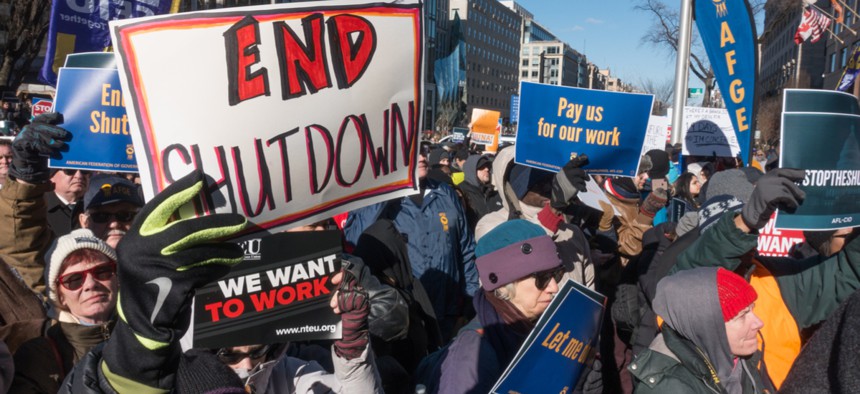Partnership for Public Service Pushes for the End of Shutdowns Forever

A protest of government shutdown by furloughed as well as unpaid working federal employees, union members, contractors and supporters at rally AFL-CIO Jan. 10. bakdc/Shutterstock.com
The nonprofit, nonpartisan group urged Congress and the president to come together.
The Partnership for Public Service cited fallout from the 35-day partial government shutdown as all the evidence necessary for Congress and President Trump to avoid a repeat of recent history.
The two sides—at odds over border funding—have until Feb. 15 to strike a deal or again furlough federal employees, cease some government functions and curtail government contracts. The Partnership for Public Service, a nonprofit, nonpartisan group, also urged Congress to take up legislation that would prevent future shutdowns.
“It is imperative that Congress and the president reach a funding agreement by the February 15 deadline, but resolving the current crisis is not enough,” said Partnership for Public Service Chief Executive Officer Max Stier, in a statement. “Congress also must take steps to guarantee we never again experience another government shutdown.”
In January, Mark Warner, D-Va., introduced the Stop STUPIDITY Act, an acronym for Stop Shutdowns Transferring Unnecessary Pain and Inflicting Damage in the Coming Years Act. The bill would guarantee agencies receive funding at the previous year’s levels if Congress can’t pass an appropriations bill by the beginning of the fiscal year. However, the bill wouldn’t cover Congress and the Executive Office of the President, so they’d feel the effects of any shutdown.
Stier called the prospect of another shutdown three weeks after the longest in U.S. history “bleak” and a national security threat.
“The recently released worldwide intelligence assessment provides a chilling list of dangers faced by the U.S. from foreign adversaries, but it did not cover a threat of our own making—the burning down of our own house with the recent partial government shutdown and the bleak prospect that it could happen all over again,” Stier said.
All told, some 800,000 federal employees were furloughed for more than one month during the previous shutdown, with many seeking secondary jobs to stem the income loss. Tens of thousands of contractors lost their jobs during the shutdown, and while some companies went to extreme means to survive the shutdown, small businesses alone lost approximately $2.3 in revenue, according to the U.S. Chamber of Commerce.






